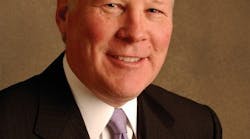“Sustainability is a big deal for us.” -William Zollars, chairman, president and CEO of YRC Worldwide
Bill Zollars, a longtime veteran of this industry and head of the $9.6 billion global transportation and logistics conglomerate YRC Worldwide, held an informal lunch this week in Washington, D.C., for the small but hardcore group of journalists in this town dedicated to covering the world of freight.
(Bill Zollars.)
Over the course of two hours, he and Michael Smid - president and CEO of YRC North American Transportation - covered a wide range of topics: the company‘s new labor deal, revamping of its domestic trucking network, fuel surcharges, changing shipper needs, the impact of high oil prices, expanding YRC‘s presence in China, etc.
But “sustainability” is one of the topics that held my attention - not in the least because Zollars highlighted it with a vengeance (in a very calm and cool manner, I stress.) While he covered the usual talking points - how YRC is a charter member of the EPA‘s SmartWay Transportation partnership, how it‘s got a new “GreenBalance” calculator on its web site to help shippers offset carbon emissions from freight transport, yadda, yadda, yadda - Zollars also made some very interesting connections, too, reinforcing to concept that being “green” today is also a major way for saving money. A LOT of money.
For example, five years ago YRC helped push for a national truck speed limit of 65 miles per hour. Though that effort died a quick death, he said if it had been enacted, the industry would have saved as a whole 1.5 BILLION gallons of diesel fuel. Multiply that by $3 to $5 per gallon, and that equals a lot of money. Right now, YRC governs all its trucks at 63 mph to get those fuel savings.
But Zollars also pointed out that the new call to return to a 55 mph national speed limit is off base - because today‘s trucks have been engineered for the best fuel efficiency between 63 and 65 mph.
He also addressed the ubiquitous television commercials being put on the air by the railroads - the ones touting the fuel efficiency and pollution reduction benefits of their services, since one train can haul some 300 freight trailers and thus take that many trucks off the road.
“The problem with rail is that you can‘t get it where you need to get it, you can‘t get it there on time, and they have no capacity,” Zollars said. “That‘s why 70% of the freight in this country is moved by truck.”
“We had this great intermodal model with the railroads,” added Mike Smid. “But with subsequent higher pricing and reliability problems, it is not possible anymore.” That doesn‘t mean YRC is abandoning rail for its shipments, but it does mean using less of it. Smid said rail miles are down 3% this year versus 2007 as a result.
(Mike Smid.)
YRC is also supporting a renewed effort to allow longer and heavier trucks on the road (Smid testified before Congress on that very subject) in part because of the sustainability benefits. Smid noted that out of the 1.8 billion miles YRC‘s trucks log every year, some 35 million are by trucks hauling triple trailers - and using triples saved some 16 million gallons of fuel and eliminated 117,000 tons of carbon emissions.
“Longer and heavier vehicles are part of the sustainability solution - though not a complete solution,” said Zollars. “They‘ll improve our productivity 30%, save fuel, and reduce emissions.”
At the same time, though, Zollars plans to resist efforts to bring a “cap and trade” system for reducing carbon emissions to the trucking industry. One reason is capping and trading emissions would be far easier to manage for some 3,000 stationary sources of carbon emissions, versus 700,000 companies operating millions of mobile producers (that would be commercial trucks.)
But more importantly, trucking has increased its carbon footprint as a direct result of other government mandates and frankly - in Zollars‘ view - needs to be cut some slack. “The EPA‘s emission regulations of 2002, 2004, 2007 and 2010 have pushed us backward in terms of fuel economy and we also produce more carbon as a result,” he said, noting that trucks pulling double trailers average 5.8 miles per gallon, while trucks pulling triples average 5.07 mpg. “These are some of those rules unintended consequences,” he noted.
There‘s also the issue of a 50-cent tax on vehicle fuels from proposed cap-and-trade systems NOT being reinvested in the U.S. transportation infrastructure. “That would negatively affect our business and the economy,” he stressed.
On the topic of alternative fuels, YRC wants the federal government to take a much more prominent role. “We need a federal standard built around biodiesel - with each state doing their own thing, it‘s counterproductive,” Zollars said. The company plans to start large-scale tests of hybrid trucks by the end of 2008 - beginning with its city pickup and delivery operations. It‘s also looking at testing wind and solar power to provide energy for its 1,000 operations centers across the country.
It‘s certainly a big effort, but that‘s going bear fruit - both for the environment and YRC‘s bottom line - in a big way.







